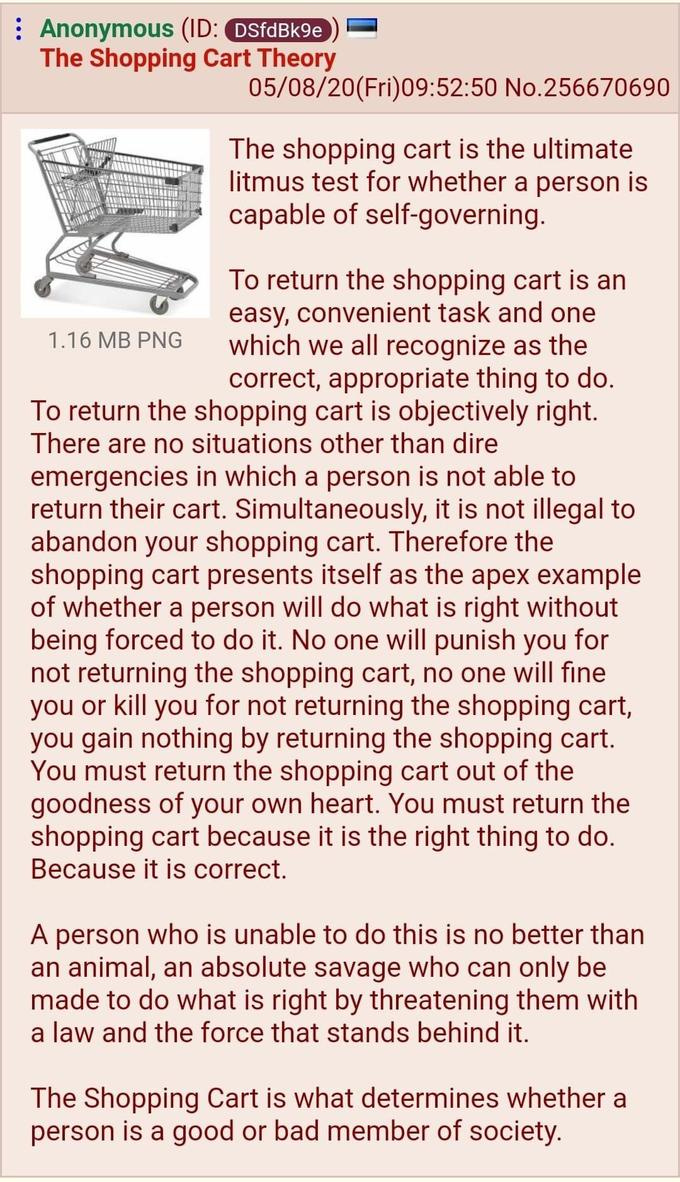Nietzsche said morality was simply a manipulation tool for the acquisition of power.
The Shopping Cart Citizen
I’ve been on a tear against returning the shopping cart recently. Half in jest, half in earnest. I just take umbrage at the idea that I, the customer, have to do increasingly more and more free labor for the giant corporation whose services I’m using. As though, somehow, people have convinced themselves that we have a moral obligation to make things easier for Walmart or Costco. They already made the decision to stop employing check-out people and force us to be our own cashiers. Now they want me to be their own buggy-boy too? And that’s after, of course, they tacitly accuse me of stealing by wanting to check my receipt because, again, they simply couldn’t be bothered to hire someone to help me check out. What’s next? Is society going to try and make it a moral imperative for me to show up to Target on Saturday and help them stock their shelves?
I know the arguments. “Yoshi,” people say, “it’s not about helping Whole Foods, it’s about helping the workers. By leaving the carts hither and yon you make more work for them.”
Not really. One, they’re paid by the hour. The workers have to be there regardless of how much there is to do. Two, if you’ve ever worked that sort of job, you know that getting to go outside is one of the best parts of such a career. A few brief moments of the day when you get to escape the Hell of Fluorescent Light Bulbs into the sunshine. A time to get away from the prying eyes of your boss who’s trying to micromanage every second of your time. And because of an internet meme people want to take that away?
Really?
What could be a full hour of bliss under the blue sky if people just scatter their karts about the parking lot turns into a cheap fifteen minutes because everyone gathered them into one spot.
Also, heaven forbid we actually ask a corporation to hire somebody. You know, pay someone and give them health insurance. You know, what, you’re right internet. I fold. Next time I go out for a burger I’m just going to walk to the back and cook it myself. I’ll pay Five Guys just for the privilege of using their kitchen. By providing free labor to the company, I’m helping the worker, whom I displace. That’s the logic, right?
I mean…
I just find the arguments silly.
But, again, I don’t really actually care. Actually.
Not about that anyway.
I care a lot more about the fact that these new social moralities can just pop up out of nowhere overnight. Seems unhealthy to me. The public deciding, for no seemingly good reason, that something nobody cared about five minutes about is now of supreme moral importance.
I’m no longer talking about shopping carts.
Meme-Based Morality
The crazy thing about the modern shopping cart phenomena is that it, like so many of our modern moral standards, started as a meme. To my knowledge, the first completed version of the ideas which make up the current attitudes of the U.S. public about returning your shopping cart were posted on May 8th, 2020. Less than three years ago.
Think about that.
In three years time, an entirely new idea of the “social contract” can be constructed. Based on a meme.
Bit scary.
A meme that got its start on 4chan no less. Bit scarier.
If you’re unfamiliar with the website I think 4chan can be fairly described as the basement of the internet. It’s not the dark-web or anything, but it is the lowest floor of the world wide web that most people can access without turning into weird creeps with a Linux server. A plethora of ideas which have since entered common parlance got their start there. The idea of an “incel” for example, or the modern justifications for white nationalism or sex changes for children. It’s a magical website. Perhaps the only place where Nazis and transsexuals-of-color get along. Sometimes, indeed, these are one and the same people.
In any case almost every internet meme of note can be traced back to 4chan. Just as in the real world, the most shitty places are also the most fertile. Sterile environments don’t grow anything. Tiktok, Instagram… no new ideas (good or bad) are produced there. They only repeat and regurgitate what already exists. Like plants, new ideas can only really thrive somewhere covered in poo. Again, I don’t recommend spending too much time on 4chan but that is where the poo is. That is where new things can grow.
After the “shopping cart return = good citizen” meme spread for a while on 4chan and grew strong, it migrated to places like Reddit and Twitter where normal people were happy to get a new thing they could feel superior about. And that’s the juice. Isn’t it? That’s what people want. Cost-free feelings of superiority. A black square on Facebook. Retweeting someone talking about trans-rights. Sharing a video of Greta Thunberg.
People love that stuff.
The American dream is to declare boldly how anti-racist you are on Facebook from your 95% white neighborhood you moved to specifically “for the schools.”
The fact that most of these moral beliefs started as the ravings of deranged people in the darkest corners of the internet is of no consequence. None of it needs to be consistent or well thought out or to even jive with their actual daily practices. It doesn’t matter that you complain about CO2 while jet setting around the world on vacations every year. It doesn’t matter that you’re an “anti-racist” who’s literally never had a single black friend. What difference does it make if you call the police every time a homeless person gets within a half mile of your house. You posted “All Cops Are Bastards” on Facebook. That makes you a good person. Right?
It’s all just about fitting in with The Group. Marking yourself as one of the “in” crowd. Marking yourself as one of the “good” people.
Some have called this behavior “virtue signalling.”
Good term.
Conservatives think this is new but it’s a behavior as old as time. It’s been done with religion for aeons. “We prayed for them,” says the couple, subtly attempting to assume the moral high ground over another. The world is full of people playing Christian as a power move. Trying to project the image that they are holier than thou. Again, virtue signalling.
Nothing new.
There was an empress of the Byzantine Empire, renowned in her day for her public piety to Jesus. Empress Zoe. She poisoned her own husband.
So…
Nietzsche was right. Morality is nothing but a shield.
A tool. A wrench to lever yourself status and power. It’s a way to signal to The Group” that you are good and should be included, as opposed to the others over there who are bad and should be cast out. That’s why Nietzsche said that the überman, the natural leader, would be the man capable of creating his own values. His own morality. Capable of seeing beyond good and evil. Such a man would recognize there was only Power. Power and the Will to seize it. Such a man would rule rightly over the underclasses, the untermensch. All those dumb schmucks who believed any of that morality talk mattered. Those with “slave morality”, constantly seeking approval from The Group.
Untermensch
Hard to argue against.
When you see how easily public opinion can be molded, over something so trivial as the returning of a shopping cart… you start to see Nietzsche had a point. Such people have no free will. They are only servants of The Group.
Keep reading with a 7-day free trial
Subscribe to Holy is He Who Wrestles to keep reading this post and get 7 days of free access to the full post archives.







